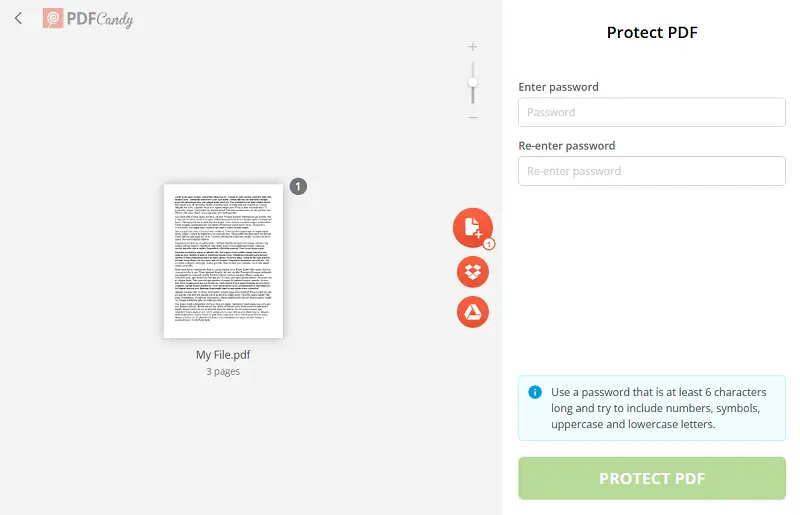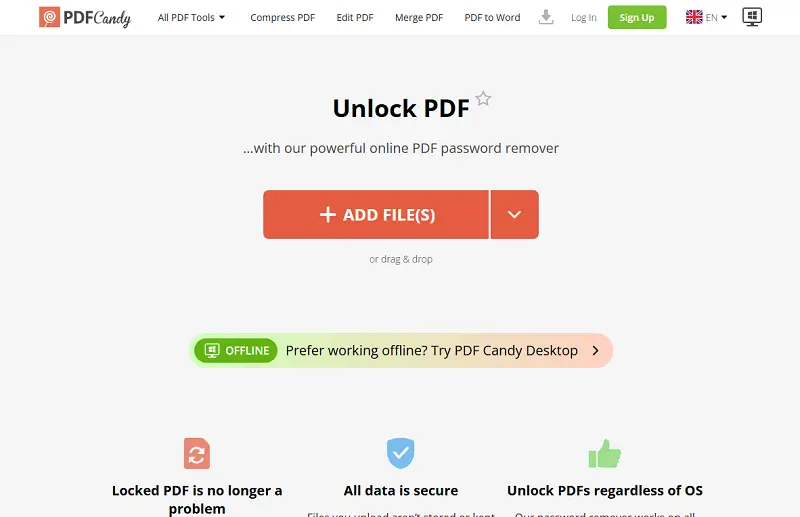Protecting private information is very important in an age when digital security is more important than ever. One way to keep your data safe is to put a code to access it.
In this article, we give you a simple step-by-step guide on how to add a password to your PDF files. You'll also find helpful tips and answers to frequently asked questions about encryption.
How to password-protect a PDF online
PDF Candy is a web-based service that offers a variety of tools for working with various text formats. There are a total of more than 90 instruments available, including the PDF password protector, which is compatible with any device and operating system.
How to use PDF Candy to add a password to your PDFs:
- Go to the "Protect PDF" tool in any browser.
- Upload from your device by clicking "Add file". Alternatively, you can import it from Google Drive or Dropbox.
- Enter a strong combination and then retype it in the confirmation field to ensure it matches.
- Press the "Protect PDF" button to set the encryption.
- Download the output file, or upload it back to the cloud storage.
PDF Candy is committed to user privacy and is GDPR-compliant. Your data is never shared with third parties. If you don’t delete it manually, it is automatically removed from the servers after two hours.

Advantages of the service:
- The platform doesn't add a watermark to your documents, so the content remains unchanged.
- The intuitive interface makes the PDF encryption process almost effortless.
- The website allows users to convert PDF files to and from various formats such as DOC, JPG, PNG, and others.
- Additionally, it offers tools for merging and splitting, compressing and editing PDFs, and more.
Tips on creating a PDF password
When choosing the code you wish to assign to your PDF, ensure it is strong enough. Below are a few suggestions on how to pick the best combination and what to do to keep your data secure.
1. Avoid personal information.
Refrain from adding personal details like your name, birth date, or address. Such information can be easily discovered and may make it simpler for others to see your PDF.
2. Keep the password confidential.
Share the code only with those who need access to the file. The more people know it, the higher the risk of it being leaked or shared without your consent.
3. Consider a passphrase.
Instead of a single word, use a passphrase— a combination of words. They are quicker to remember and more difficult to crack.
4. Test the password protection.
After setting a key for your PDF, ensure it works correctly by testing it. This helps identify any potential issues or vulnerabilities before you share the document.
5. Change regularly.
Just like with online accounts, periodically update the password for your encrypted PDF to reduce the risk of unauthorized access if the old combination is compromised.
6. Don't exchange via email.
Email is not a safe method for sharing passwords, as it can be intercepted. Use a more secure communication method, such as encrypted messaging apps.
How to unlock a PDF
When you no longer require file protection, you can try the PDF password remover to decrypt the document.
Typically, you'll need to enter the security code to remove the encryption. However, if you've forgotten the code, some tools may be able to unlock the PDF without the exact code.

Reasons to put a password on a PDF
Here are a few of the most common reasons why people password-protect their PDFs.
| Point | Description |
|---|---|
| Protecting Confidential Information | Keeping safe sensitive data such as financial records, personal IDs, and medical files, by restricting access via protection. |
| Controlling Access | Taking control over document access, especially useful for distributing among multiple individuals or in corporate settings. |
| Preventing Unlawful Distribution | Avoiding unauthorized forwarding or sharing, ensuring it remains accessible only to intended recipients. |
| Compliance with Regulations | Facilitating obedience to industry laws such as HIPAA by securing sensitive information within PDF. |
| File Transfer | Adding an extra layer when sending PDFs via email or online uploads, reducing the risk of interception by cybercriminals. |
| Keeping Privacy | Safeguarding personal data like financial statements or journals, maintaining privacy by requiring a code. |
FAQ
What is the difference between user-level and owner-level PDF passwords?
A user-level one restricts access to certain actions within the PDF, such as printing or editing. An owner-level code gives full control over the document. It is recommended to add both types of encryption for maximum security.
Can I add a password to a PDF on my mobile device?
Yes, many apps offer the ability to password-protect PDF files. To secure your content, you can try online tools such as PDF Candy to set a password from any device with an internet connection.
What happens if I accidentally share the password with the wrong person?
It’s important to change the code immediately if possible. This will prevent the unintended party from accessing the document. Update the password and redistribute it only to authorized users.
Can I set different passwords for diverse sections of a single PDF?
Standard encryption typically secures the entire PDF with a single password. To set different codes for each chapter, you would need to split the PDF into separate files and apply to each section.
Can I protect a PDF without using a password?
Yes, some platforms allow you to restrict access through permissions or secure links. For example, cloud-based services might let you share a file with view-only rights or limited based on authentication.
What should I do if I forget the code to my PDF?
If there’s no backup, you may need to use a recovery tool. Keep in mind that retrieving access to a strongly encrypted file without the key may be difficult or even impossible, depending on the protection level.
Conclusion
In the end, putting a password on your PDFs is a simple but effective way to keep private information safe from people who shouldn't have it.
Our online service makes it easy and free to add an extra layer of security to your documents.
Use a strong, unique combination and think about what your content needs. There are a lot of free options, but you should always be careful and only go to sites you trust to keep your information safe.
Check other free PDF tools
- Edit PDF using the full-featured free online service.
- Compress PDF files to facilitate easier sharing.
- Transforming your PDF into editable DOC or DOCX formats with just one click.




.webp?w=420&h=184)